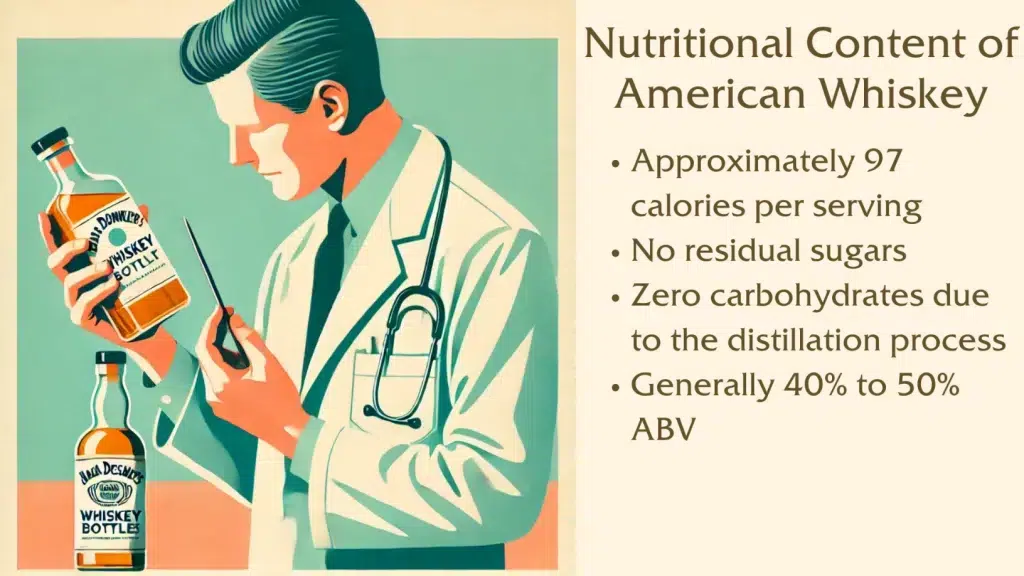Savoring a glass of American whiskey is an experience steeped in flavor, tradition, and history. Beyond its rich taste and cultural significance, it’s worth exploring the nutritional profile of this beloved spirit. Understanding the caloric content and nutritional value of American whiskey not only deepens your appreciation for it but also helps you make informed choices about its place in your lifestyle. A standard serving of American whiskey—1.5 ounces—contains approximately 97 calories, derived entirely from alcohol, with no fat, protein, or carbohydrates. This clean nutritional profile makes it a relatively straightforward addition to a balanced diet when enjoyed in moderation.
In this article, we’ll dive into the nutritional facts of American whiskey, examining its calorie count, macronutrient content, and how it compares to other beverages. Whether you’re enjoying it neat, on the rocks, or in a classic cocktail, understanding these details can help you enjoy American whiskey responsibly while appreciating its enduring appeal.
What is American Whiskey
American whiskey is a diverse and richly crafted distilled spirit made primarily from grain, encompassing iconic styles such as Bourbon, Tennessee Whiskey, Rye, and American Single Malt. Each type follows strict regulations governing its grain composition, production methods, and aging requirements, creating distinctive flavor profiles that set them apart. Bourbon, for example, must be made from a mash bill containing at least 51% corn and aged in new charred oak barrels, resulting in its signature sweet, full-bodied taste with notes of caramel and vanilla. These requirements ensure consistency and authenticity, making Bourbon one of the most beloved American whiskey styles.
Tennessee Whiskey shares many similarities with Bourbon but distinguishes itself through the Lincoln County Process, a step where the whiskey is filtered through charcoal before aging. This additional process imparts a smoother, mellower finish, highlighting subtle notes of sweetness and oak. Rye Whiskey, on the other hand, brings boldness to the table with a mash bill containing at least 51% rye. Its spicier, more robust flavor profile appeals to those who enjoy complex, peppery, and slightly earthy undertones, making it a standout choice for classic cocktails like the Manhattan or Sazerac.
American Single Malt, a relative newcomer, is rapidly gaining recognition for its craftsmanship and focus on quality. Made entirely from malted barley, this style showcases the nuances of the grain and the distillation process, offering flavors that can range from rich and nutty to fruity and floral. Together, these styles illustrate the remarkable versatility and innovation within American whiskey, ensuring there is a perfect expression for every palate. Whether you prefer the sweetness of Bourbon, the spice of Rye, the smoothness of Tennessee Whiskey, or the malty complexity of Single Malt, American whiskey continues to captivate and evolve as a celebrated spirit.
Calories in American Whiskey
A standard serving of American whiskey, typically measured as 1.5 ounces (44 milliliters), contains approximately 97 calories. These calories come almost entirely from alcohol, as whiskey is a distilled spirit with no significant amounts of carbohydrates, fat, or protein. The absence of residual sugars and carbs is a result of the distillation process, which removes most non-alcoholic components, leaving behind a clean and calorie-efficient beverage. This makes pure whiskey a low-carb option, appealing to those on low-carbohydrate or ketogenic diets when enjoyed in moderation.

The calorie content of American whiskey can vary slightly depending on the type and its alcohol by volume (ABV). Whiskeys with higher ABV, such as cask-strength varieties, will contain more calories per serving due to the increased concentration of alcohol. For example, while a standard 40% ABV whiskey typically has around 97 calories per serving, a higher-proof whiskey might reach 120 calories or more. Despite this variation, the caloric difference is minimal for occasional drinkers and can be managed with mindful portion control.
When consumed neat, on the rocks, or with a splash of water, whiskey remains a relatively low-calorie beverage compared to sugary cocktails or mixed drinks. However, calorie counts can quickly climb if whiskey is paired with high-calorie mixers such as cola, sweetened syrups, or cream-based additions. For those who appreciate whiskey’s rich flavors and nuanced aromas, enjoying it in its purest form not only preserves its character but also minimizes unnecessary calorie intake, making it an ideal choice for responsible indulgence.
Carbohydrates in American Whiskey
American whiskey stands out as a carb-free option, making it an excellent choice for those monitoring their carbohydrate intake. Regardless of the type—whether it’s Bourbon, Tennessee Whiskey, Rye, or American Single Malt—pure whiskey contains zero carbohydrates. This is thanks to the distillation process, which removes the sugars and starches present in the original grain mash, leaving behind a clean, carb-free spirit. As a result, whiskey offers a guilt-free way to enjoy a flavorful drink without impacting carb-focused dietary goals, such as low-carb or ketogenic lifestyles.
While pure American whiskey is entirely carb-free, it’s important to recognize that flavored whiskeys and whiskey-based cocktails may introduce sugars, significantly altering the carbohydrate content. Flavored varieties often have added syrups or sweeteners, and popular cocktails like whiskey sours or Old Fashioneds frequently include sugary mixers that can contribute a substantial amount of carbs. For those aiming to minimize carbohydrate consumption, these additions should be consumed in moderation or avoided altogether in favor of whiskey’s natural, unaltered form.
For whiskey enthusiasts who enjoy their drink straight, on the rocks, or with a splash of water, American whiskey remains a versatile and carb-free option that doesn’t compromise on flavor. Its ability to offer bold, complex flavors while maintaining a clean nutritional profile makes it a standout among spirits. Whether you prefer the sweetness of Bourbon, the spiciness of Rye, or the smoothness of Tennessee Whiskey, American whiskey’s lack of carbs ensures that you can savor it responsibly while aligning with your dietary preferences.
Alcohol Content
The alcohol content in American whiskey varies significantly across types and brands, generally ranging from 40% to 50% alcohol by volume (ABV), with some cask-strength or barrel-proof varieties reaching even higher levels. This ABV measurement indicates the percentage of pure alcohol in the whiskey, directly influencing its potency, flavor profile, and the overall drinking experience. Whiskeys with higher ABV often deliver bolder and more intense flavors, appealing to those who prefer a robust and full-bodied sip, while lower ABV options provide a smoother and more approachable experience.
Several factors influence the final alcohol content of American whiskey, including the distillation process, the aging period, and the type of barrels used for maturation. For example, cask-strength whiskeys are bottled directly from the barrel without dilution, preserving their natural ABV and offering a raw, unfiltered tasting experience. On the other hand, most standard whiskeys are diluted with water to achieve a consistent ABV, typically around 40%, making them versatile and widely appealing. The longer a whiskey ages, the more its flavor and potency can evolve, creating a diverse range of options for whiskey lovers to explore.
This variation in alcohol content is part of what makes American whiskey so dynamic and appealing. Whether you prefer a smooth Tennessee whiskey at 40% ABV or a fiery rye at 55%, there’s an option to suit every palate and occasion. For enthusiasts and connoisseurs alike, this spectrum of strengths allows for a deeper appreciation of the craftsmanship and creativity that define American whiskey. Understanding ABV not only enhances your ability to enjoy whiskey responsibly but also helps you select a spirit that aligns with your preferences and the desired intensity of flavor.
Comparison with Other Spirits
When comparing American whiskey to other spirits, its distinctiveness becomes immediately apparent in flavor, alcohol content, and production methods. Unlike vodka, which is prized for its neutrality and clean finish, American whiskey boasts a rich and layered flavor profile. Notes of caramel, vanilla, and oak are common, complemented by the smoky or spicy characteristics derived from the grain mash and charred oak barrel aging. Similarly, gin’s botanical infusion of juniper and other herbs creates a sharp, aromatic profile that contrasts with whiskey’s warmth, depth, and complexity.
Tequila, crafted from the agave plant, offers a vastly different spectrum of flavors ranging from sweet and vegetal to earthy and peppery, depending on the type (blanco, reposado, or añejo). While American whiskey and tequila share the commonality of barrel aging in certain styles, whiskey’s mandatory use of charred oak barrels and its reliance on grains rather than agave give it a unique identity. Rum, another aged spirit, tends to highlight sweet, molasses-based flavors, but its aging process often lacks the stringent requirements of American whiskey, leading to broader variation in flavor profiles.
Alcohol content in American whiskey typically aligns with other spirits, hovering around 40% to 50% ABV, though barrel-proof or cask-strength varieties can exceed this range. However, the production process sets whiskey apart, with its focus on fermentation, distillation, and aging in charred oak barrels for extended periods. This aging process is pivotal in shaping whiskey’s nuanced flavors, creating a depth and character rarely matched by spirits like vodka, which is unaged, or gin, which emphasizes freshness and botanicals. American whiskey’s intricate production and aging requirements contribute to its rich heritage and complex taste, solidifying its place as a standout choice among spirits.
Health Considerations
Moderate consumption of American whiskey, typically defined as up to one standard drink per day for women and two for men, can be part of a balanced lifestyle when enjoyed responsibly. A standard drink of whiskey, measured as 1.5 ounces, provides approximately 97 calories with no carbohydrates, fats, or proteins, making it a relatively straightforward option for those mindful of their caloric intake. Some studies suggest that moderate alcohol consumption, including whiskey, may have potential cardiovascular benefits, such as raising good cholesterol (HDL) levels and reducing the risk of certain heart conditions. However, these benefits are only observed within the context of moderation and a generally healthy lifestyle.

Excessive consumption of American whiskey or any alcohol poses significant health risks that far outweigh potential benefits. Overindulgence can lead to liver damage, weight gain due to the caloric density of alcohol, increased blood pressure, and a higher likelihood of developing alcohol dependency or addiction. Chronic heavy drinking is also associated with an elevated risk of heart disease, stroke, and certain cancers. Beyond physical health, excessive alcohol use can impair judgment, disrupt sleep, and negatively impact mental well-being, making moderation essential for long-term health and quality of life.
Consumers should be mindful of these potential risks and make informed decisions about their drinking habits. Sipping whiskey in moderation, choosing high-quality spirits, and pairing them with healthy, balanced meals can enhance enjoyment while minimizing adverse effects. By staying aware of portion sizes and drinking responsibly, individuals can appreciate the rich flavors and traditions of American whiskey without compromising their health or well-being.
Moderate Consumption
Defined as up to 1 drink per day for women, 2 for men, moderate consumption of American Whiskey aligns with guidelines for maintaining a balanced lifestyle. This approach allows individuals to enjoy whiskey’s rich flavors and cultural significance without compromising their health.
Risks of Excessive Drinking
Excessive consumption of American Whiskey can lead to a variety of health issues, highlighting the importance of moderation. Key risks include:
- Increased risk of liver disease: Heavy drinking can cause significant damage to the liver, leading to conditions such as cirrhosis.
- Potential for addiction: Alcohol dependence can develop from continued overconsumption of whiskey.
- Weight gain: High caloric content in alcohol can contribute to unwanted weight gain.
- Increased risk of heart disease: Excessive alcohol intake is linked to a higher risk of developing cardiovascular diseases.
American Whiskey Nutrition FAQs:
Navigating the world of American Whiskey, enthusiasts often have questions regarding its compatibility with various health conditions and dietary choices. Addressing these inquiries, we explore how American Whiskey fits into diets managing acid reflux, diabetes, general weight management, and even ketogenic diets. Additionally, concerns about hangovers associated with whiskey consumption are addressed, providing a comprehensive understanding of how to enjoy American Whiskey responsibly and healthily.
This section aims to clarify common uncertainties, allowing individuals to make informed decisions that align with their health and wellness goals.
Can you drink American Whiskey with Acid Reflux?
Individuals with acid reflux may find that American Whiskey can exacerbate their symptoms due to its acidity and alcohol content. Consulting with a healthcare provider for personalized advice is advisable.
Can you drink American Whiskey with Diabetes?
For those managing diabetes, moderation is crucial. While American Whiskey contains no carbohydrates, it can still indirectly affect blood sugar levels. Monitoring consumption and seeking advice from a healthcare professional is recommended.
Can you drink American Whiskey on a diet?
Yes, American Whiskey can be enjoyed on a diet, given its zero carbs or fats content. However, being mindful of its caloric content, which comes from alcohol, is essential for weight management.
Can You Drink American Whiskey While on a Ketogenic diet?
American Whiskey is ketogenic-friendly, containing zero carbohydrates. However, its calories should be accounted for within the daily caloric intake to maintain ketosis.
Does American Whiskey give Hangovers?
Like all alcoholic beverages, excessive consumption of American Whiskey can lead to hangovers. The severity of hangovers varies based on the amount consumed and individual tolerance levels.





